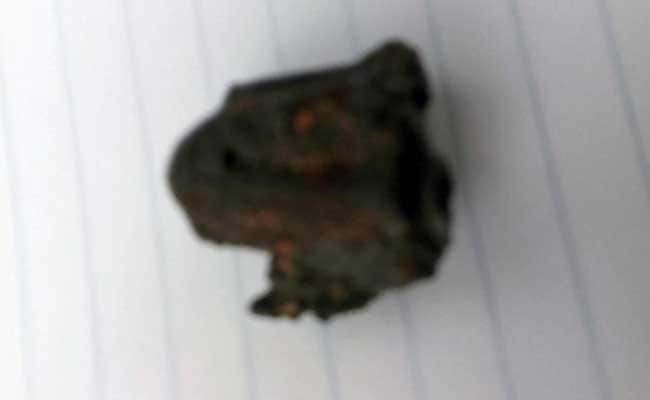
The explosion had left a crater in the ground.
Chennai:
Local authorities in Tamil Nadu are investigating whether the death of a man at a college campus over the weekend was the result of a falling meteorite.
A blast at Bharathidasan Engineering College left a crater in the ground and blew out glass windows in nearby buildings. A bus driver who was standing close to the site perished; a number of others, including a gardener and a student, were injured.
After investigators couldn't find any evidence of explosives, some concluded that the cause of the blast could have been extraterrestrial. According to reports, a blue stone the shape of a diamond was found near the scene.
This led to a statement from Tamil Nadu's Chief Minister, Jayalalithaa Jayaram.

"A meteorite fell within the college premises," said Jayalalithaa. The victim, V. Kamaraj, "sustained serious injuries and died while on the way to the hospital," she said. Her government paid his family $1,471 in compensation.
The last recorded human fatality caused by a meteorite was in 1825, according to a list kept by International Comet Quarterly. That, too, was in India.
In 1954, a woman in Alabama was injured when a meteorite crashed through the roof of her house.
Other Indian officials are being more circumspect about the incident in Tamil Nadu.
"When no evidence of explosive material was found, we moved to the theory that it might be a meteorite," a local district official told Reuters. "It is not confirmed yet, as samples need to be analyzed."
A team of researchers from the Indian Institute of Astrophysics is expected to visit and study the site on Tuesday. Sujan Sengupta, an associate professor at the institute, told the Wall Street Journal that there was "extremely little possibility of a small meteorite falling to the ground" and harming anyone.
"If a bigger asteroid enters the Earth's atmosphere, it will disintegrate and travel in different directions, and because most of the Earth's surface is covered in water, it is most likely to fall into the ocean," he added.
The last major event of space rock plummeting to earth took place in 2013, when a large meteor exploded over the Russian region of Chelyabinsk, causing numerous injuries but no fatalities.
The fall of meteorites and the passing of comets played an outsize role in much of premodern history. Space debris became objects of religious fascination, while streaking asteroids were often interpreted as oracular signs from the heavens.
A blast at Bharathidasan Engineering College left a crater in the ground and blew out glass windows in nearby buildings. A bus driver who was standing close to the site perished; a number of others, including a gardener and a student, were injured.
After investigators couldn't find any evidence of explosives, some concluded that the cause of the blast could have been extraterrestrial. According to reports, a blue stone the shape of a diamond was found near the scene.
This led to a statement from Tamil Nadu's Chief Minister, Jayalalithaa Jayaram.

Authorities say they have recovered a piece of the meteorite.
"A meteorite fell within the college premises," said Jayalalithaa. The victim, V. Kamaraj, "sustained serious injuries and died while on the way to the hospital," she said. Her government paid his family $1,471 in compensation.
The last recorded human fatality caused by a meteorite was in 1825, according to a list kept by International Comet Quarterly. That, too, was in India.
In 1954, a woman in Alabama was injured when a meteorite crashed through the roof of her house.
Other Indian officials are being more circumspect about the incident in Tamil Nadu.
"When no evidence of explosive material was found, we moved to the theory that it might be a meteorite," a local district official told Reuters. "It is not confirmed yet, as samples need to be analyzed."
A team of researchers from the Indian Institute of Astrophysics is expected to visit and study the site on Tuesday. Sujan Sengupta, an associate professor at the institute, told the Wall Street Journal that there was "extremely little possibility of a small meteorite falling to the ground" and harming anyone.
"If a bigger asteroid enters the Earth's atmosphere, it will disintegrate and travel in different directions, and because most of the Earth's surface is covered in water, it is most likely to fall into the ocean," he added.
The last major event of space rock plummeting to earth took place in 2013, when a large meteor exploded over the Russian region of Chelyabinsk, causing numerous injuries but no fatalities.
The fall of meteorites and the passing of comets played an outsize role in much of premodern history. Space debris became objects of religious fascination, while streaking asteroids were often interpreted as oracular signs from the heavens.
Track Latest News Live on NDTV.com and get news updates from India and around the world

